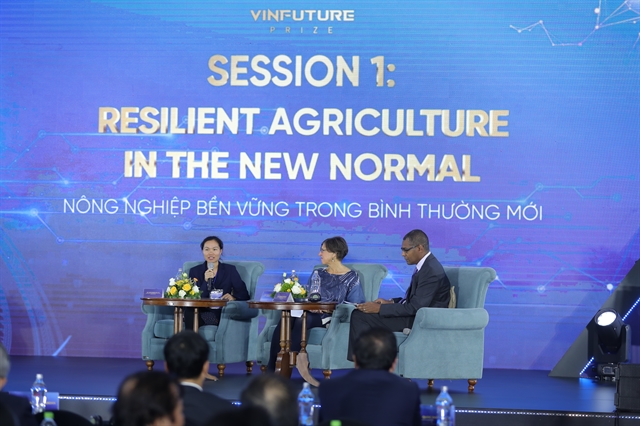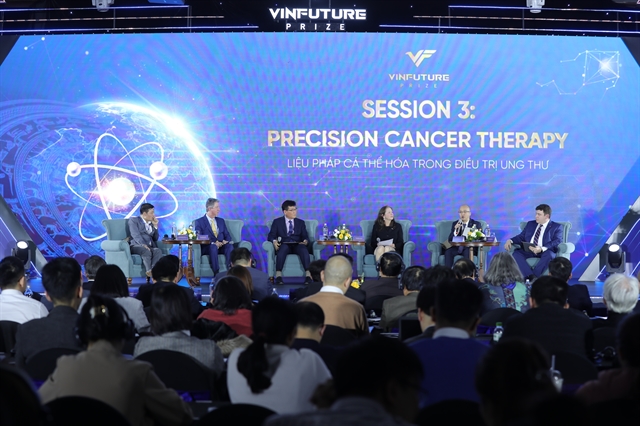 Economy
Economy

 |
| A panel discussion with the theme of resilient agriculture in the new normal in Hà Nội. — VNS Photo Thanh Hải |
HÀ NỘI — Sustainable agriculture, renewable energy, new materials, and new therapies in cancer treatment were the main topics of a symposium in Hà Nội on December 19.
With the theme “Science for Life“, the event is part of the VinFuture Prize 2022’s Award Ceremony Week, attracting the participation of many well-known local and international scientists.
This year’s symposium focused discussion on pressing global issues, practical solutions, and predictions of key changes in people’s lives through the contributions of science and technology, such as resilient agriculture in the new normal, advanced materials for future energy storage, and precision cancer therapy.
Speaking at the event, Bùi Thế Duy, Deputy Minister of Science and Technology, said that the symposium’s topics were very practical and scientific and can make a revolution in people's lives, especially in the process of reviving and reconstructing the world after the damage caused by the COVID-19 pandemic.
“Agricultural production is the sector most affected by climate change, but agriculture production is also one of the causes of climate change. So what is the solution for agriculture that can balance and develop sustainable agriculture, effectively adapt to climate change and increasingly complex epidemics, as well as ensure global food security?” said Duy.
“An important factor in making sustainable agriculture is finding a balance between the needs of food production and the preservation of the ecosystem, environment and public health. This challenge requires countries to have new directions, new breakthrough solutions that only science and technology can solve,” said Duy.
In Việt Nam, science, technology and innovation are among the driving forces that make Việt Nam one of the top 15 countries in the world in exporting agricultural products. Currently, many Vietnamese-branded agricultural products have been successful in markets that require high quality and are well received by international consumers. It is estimated that science and technology contribute over 30 per cent of the added value in the agricultural sector and about 38 per cent of the added value in the production of plant varieties and livestock, according to Duy.
Van Schepler-Luu from IRRI, Việt Nam and the Philippines, said that diseases reduce crop yields by 30 per cent every year. Pesticides also affected people’s lives and the environment. Climate change also leads to disease outbreaks in agriculture, causing a global food shortages.
Professor Ermias Kebreab (University of California, Davis, USA) said that the most important and urgent problem of world agriculture today was finding solutions to adapt to the negative impact of climate change, which causes many natural phenomena that are harmful to agricultural production.
International speakers said that among the solutions could be the development of flood-resilient rice varieties, the application of gene editing technology and modern breeding to deal with plant pests.
At the second session, "New materials for the future of energy storage", international scientists discussed issues on battery materials, green energy transitions, massive electrical energy storage, recycling, and the future of hydrogen energy.
 |
| A panel discussion on precision cancer therapy at the “Science for Life“ symposium in Hà Nội. — VNS Photo Thanh Hải |
During the precision cancer therapy session, speakers shared the latest advanced research, applications and development potential of cell therapy and gene therapy for precise and personalised treatment of cancer, one of the most common global diseases that causes significant losses to society and threatens global health.
Scientists believe that artificial intelligence (AI) and assistive technology can be applied in the development of cancer prevention strategies.
Mark Steven Cohen from the University of Michigan suggested nations develop a national database on cancer from which scientists can access classified data on which cancers are common and which are rare, to detect early on whether existing treatments are effective.
Prof. Bruce Levine from Perelman School of Medicine, University of Pennsylvania, said that six gene therapies for the treatment of cancer were approved in North America, Europe, Japan and Australia and almost 20,000 patients have been treated with these new therapies. There are also gene-modified therapies to treat certain hemoglobinopathies, such as sickle cell disease or haemophilia.
“It's a new pillar of medicine. So we are in an era of new medicine, where we are able to genetically modify cells to correct gene error, or to redirect immune cells to find cancer and kill cancer,” said Levine.
Levine added that in 2023 the world would see significant improvement in cancer treatment therapy, including T-cell treatment and virus therapy. Scientists in Germany have done strong research on T-cells, especially the application of T-cells to treat cancer in women.
From a technology perspective, Prof. Vũ Hà Văn of Yale University proposed to use AI in supporting cancer treatment for early detection and evaluating the effectiveness of drugs during treatment.
“Cancer treatment is expensive and painful. One of the applications we can think of is the early detection of cancer. Detecting cancer at the early stage of the disease would reduce pain and costs for patients. This I hope to promote in Việt Nam because many people are diagnosed with cancer at a late stage,” said Văn.
Văn said that it would be necessary to deploy a digitisation system in healthcare through the establishment of a clean data platform linking hospitals to share information in order to promote cooperation in research and enhance research efficiency.
“We often focus on treating cancer at a late stage. That makes us realise we should focus on treating cancer at an earlier stage by screening and then addressing the root cause. This means that it is necessary to combine early detection and early treatment,” said Prof. Je-Jung Lee from Chonnam National University Hwasun Hospital.
Dr. Phương Lê Trí from AstraZeneca Vietnam proposed a clinical trial in Việt Nam because there are many patients with different types of cancer in the country. "It's an opportunity for large-scale adoption to reduce costs and have a large enough sample," Trí said.
“It is necessary to develop a set of regulations on data governance and increase the ability of patients to participate in clinical trials. These will be a favourable condition in Việt Nam in particular and in developing countries just participating in new cancer therapies," added Trí. — VNS




